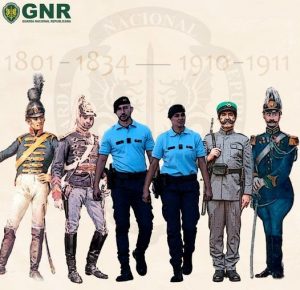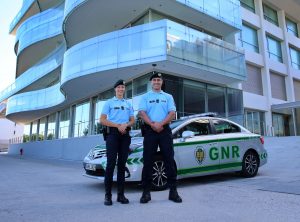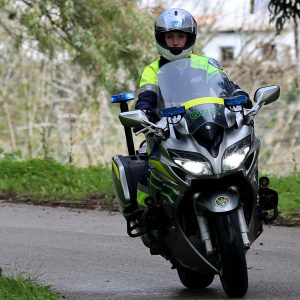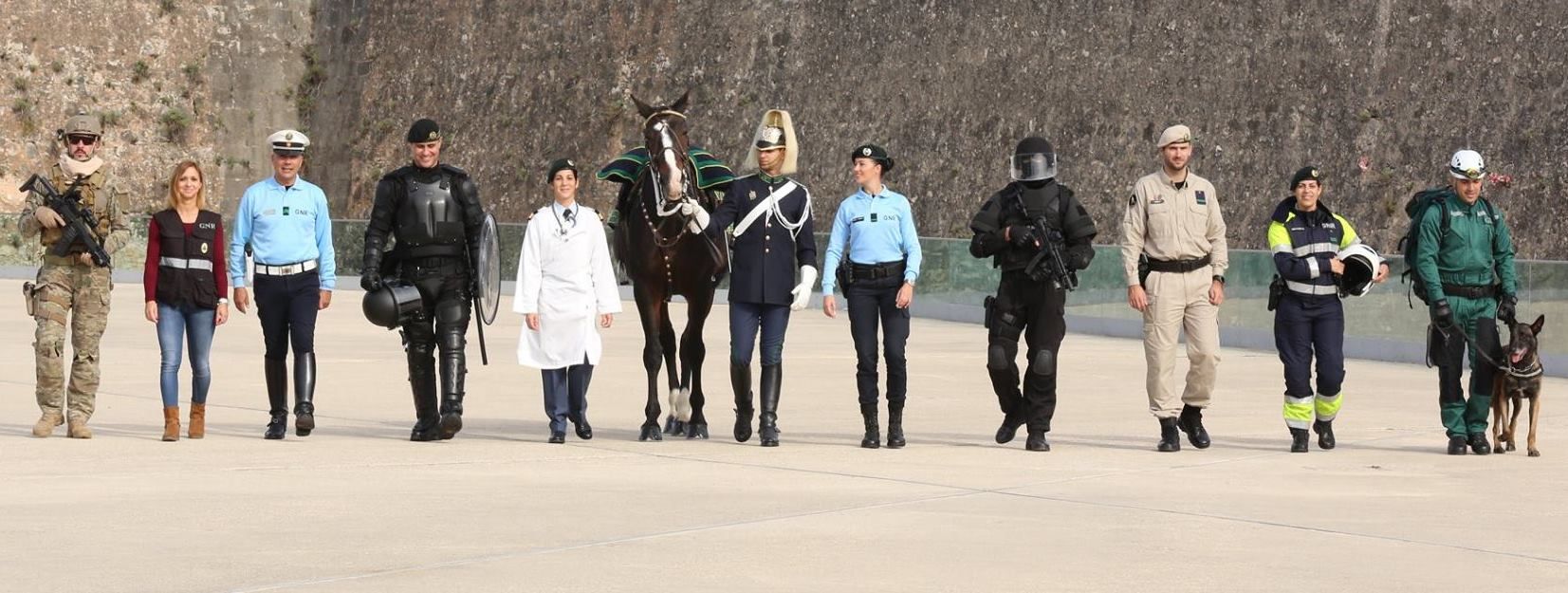Portugese National Republican Guard
The Guarda Nacional Republicana, whose origins date back to 1801, at which time the Guarda Real de Polícia (Royal Police Guard) was created, is a Security Force constituted by military elements that are organized in a Special Body of Troops, which actively and permanently veil for the execution of the law and are dedicated to the security and public order maintenance cause as well as to the protection and defence of the people and their goods. The Constitution of the Portuguese Republic, the National Defence and Armed Forces Law, the Internal Security Law and the Law on the General Basis of the Military Condition constitute the institutional juridical framework on which the legislation of the present Guarda Nacional Republicana (GNR) is based.
The Guarda Nacional Republicana is heir to the traditions of the Quadrilheiros (elements armed with rods or spears), of the Guarda Real da Polícia (Royal Police Guard) and of the Guarda Republicana (Republican Guard). Its fundamental standards are based on its own particular Organic Law (Law number 63 dated 06 November 2007) and on the Statutes of the Military Elements (Officers, Sergeants and Guards) of the Guarda Nacional Republicana (Decree-Law 30 dated 22 March 2017) which are currently being revised and of the General Service Regulation of the Guarda Nacional Republicana (Decree number 96 of 2009).
Dependency
It has a double dependency, depending in time of peace, on the Minister of Internal Administration, for purposes of recruitment, administration, discipline and execution of the current service of its general mission and on the Minister of National Defence for purposes of uniformization and normalization of the military doctrine, armament and equipment. Its force may, in case of war or in situations of crisis, be placed under the operational dependency of the Chief of the General Staff of the Armed Forces, through its General Commander.
The logo it displays – For the Law and For the People – perfectly reflects the ethical basis of all its activities, which are always founded on the legitimacy that emanates from the democratically established laws.
Due to its nature and polyvalence, the GNR, as a Gendarmerie type of force, is institutionally positioned amongst the military forces and the security forces and services.
It carries out missions throughout all of the national territory, in the territorial sea and also at an international level.
Every element of the Guarda Nacional Republicana, in the performance of his or her duties, is an officer of the Public Force and an Authority officer, thus any resistance or disobedience to his or her legitimate orders constitutes disobedience of authority, which is grievously punishable by penal law.
The accelerated social-political evolution of the country and the quantitative and qualitative increase in criminality imposes on this Special Body of Troops and on all of its personnel a continuous effort towards the valorisation, actualization and revision of the manners of performance. The exact fulfilment of the difficult mission attributed to the Guarda Nacional Republicana, which the country expects and demands that it performs in an exemplary manner, is the imperative condition that orients all of its elements.
Under the terms of the Organic Law, the GNR has the following responsibilities:
- Ensure security conditions that allow the exercise of rights and freedoms and respect for the guarantees of citizens, and the full functioning of democratic institutions, respect for legality and principles of the Rule of Law;
- Ensure public order and tranquillity, and security and protection of persons and property;
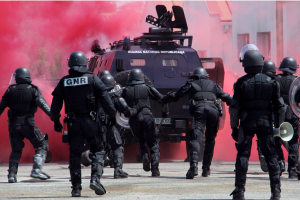
- Prevent crime in general, in coordination with other security forces and services;
- Prevent the commission of other acts contrary to the law and regulations;
- Undertake criminal actions and administrative offenses assigned by law, delegated by the judicial authorities or requested by the administrative authorities;
- Ensure compliance with laws and regulations on land traffic and road transport and promote and ensure road safety, in particular through traffic inspection, planning and discipline;
- Ensure the implementation of administrative acts issued by the competent authority designed to prevent any breach of the law or its continued violation;
- Participate in monitoring the entry and exit of persons and property in the national territory;
- Protect, rescue and assist citizens and defend and preserve properties that are in hazardous situations for reasons arising from human action or nature;
- Vigilance and protection of sensitive points, namely road, railway, airport and port infrastructures, public buildings and other critical facilities;
- Ensure security at shows including sports, and other recreational and leisure activities, under the terms of the law
The GNR also has the following responsibilities:
- Ensure compliance with legal and regulatory provisions relating to nature and environment protection and conservation, and prevent and investigate related unlawful acts;
- Ensure traffic inspection, planning and discipline on all infrastructures axes constituting the full extent of the Basic National Network and the Complementary National Network outside of the metropolitan areas of Lisbon and Porto;
- Within the scope of its mission, ensure land and sea surveillance, patrolling and interception along the coast and territorial sea of the mainland and the Autonomous Regions;
- Prevent and investigate tax, fiscal and customs offences, and inspect and control the movement of goods subject to tax, fiscal and customs measures;
- Control and inspect vessels, their passengers and cargo, for the purposes provided for in the preceding paragraph and, additionally, for the fulfilment of other legal obligations;
- Participate in the inspection of the capture, landing, culture and sale of marine species, in cooperation with the National Maritime Authority and within the framework of the legislation applicable to the sea fishing activity and the culture of marine species;
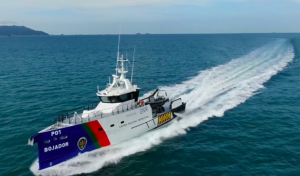
- Carry out frontline prevention and intervention actions, throughout the national territory, in emergency situations pertaining to protection and rescue, namely in occurrences of forest fires or hazardous materials, disasters and serious accidents;
- Collaborate in the rendering of state honours;
- Within the scope of implementing the national defence policy and in collaboration with the Armed Forces, fulfil the military missions with which it is entrusted;
- Ensure a national point of contact for the international exchange of information relating to the vehicle crime phenomena with cross-border repercussions, without prejudice to the competences attributed to other criminal police bodies.
Structure and organization
The GNR general organisation is tripartite, between the Command Structure, Units and the Teaching Establishment. The Command Structure comprises the GNR Command (composed of the General Commander, the Deputy General Commander, the GNR Inspection, Council Bodies and the GNR General Secretariat) and the Superior Command and Management Bodies, namely the Operational Command, the Internal Resources and Administration Command, and the Doctrine and Training Command.
The GNR is made up of 27 Units, among which 20 Territorial Commands, covering districts and the Autonomous Regions (Madeira and Azores), 4 Specialised Units (the National Traffic Unit, the Fiscal Action Unit, the Coastal Control Unit and the Protection and Rescue Emergency Unit), a Representation Unit (the Security and State Honours Unit), an Intervention and Reserve Unit (the Intervention Unit) and the Teaching Establishment (GNR School).
The GNR has approximately a total staff of 23,000 military elements and 900 civilians, who carry out their missions throughout 94% of the national territory (86,594.4 square miles) for a 53,8% of the population (5,756,027).
Education/Training
The Guarda Nacional Republicana has a superior Command and Management organ, namely the Training and Doctrine Command, and a teaching establishment, which is the GNR School. It also has two training centres, one in Portalegre and another in Figueira da Foz.
The mission of the Training and Doctrine Command is to assure the command and management of all GNR activities in what concerns to doctrine and training. The GNR School is the training establishment which is vocationed for the behavioural, cultural, physical, military, technical and professional training of the GNR military elements, as well as for the modernization, specialization and valorisation of their acknowledgements.
The main training objectives within the GNR are to:
- Improve the quality of the service rendered to the civil society;
- Prepare the military element to suitably carry out all types of functions;
- Strengthen the competences of the military element.
Given that the GNR is a trustworthy and neighbourly human organisation, the quality of the service depends on the investment made on the knowledge and the competences. The training is, thus, a strategic resource for us. As such, within the Guarda Nacional Republicana, it is understood as a collection of educational, pedagogical and doctrinal activities that seek the attainment and promotion of acknowledgements, and technical and professional attitude and behavioural competences required to carry out the duties of a military element.
The cited process is divided into four stages: Analysis, Conception, Execution and Assessment.
In the first stage a diagnosis process is elaborated on the training necessities. The GNR Units (CDF clients/users) are sounded in order to inform the Training and Doctrine Command of their training needs in what concerns to the training necessities of their personnel.
In a second stage the assessment objectives and criteria, the training contents and respective training programmes are defined. Given that the objective is to prepare the military elements to carry out their duties, the selection of methods and pedagogic techniques is of crucial importance for the GNR. The active methods are those privileged in the run of the courses, above all in specialization and qualification courses.
The third stage consists of executing/giving courses at the GNR School.
The fourth stage of the training model is the assessment. This phase seeks to verify the quality of the training process, namely to enquire if the training given meets up to the needs initially diagnosed. In case of deviation, corrective measures are initiated and implemented.
The training process is based on a profound analysis of the functions carried out by each of the different ranks that constitute the three categories (Officers, Sergeants and Guards). Professional profiles, which correspond to training profiles, are defined in view of the function analysis. Courses are contemplated in the Training Catalogue, which is annually elaborated for the different training profiles. As soon as the training is successfully given, it is registered in the training report competence book of the military element. The cited passport, which is issued by a training entity, is where all of the valences acquired by the military element are registered. The training entity may be the GNR School or another credentialed entity in case of resorting to external training.
The training model aims to:
- Assure conditions for promotion, so that the military elements of all categories may progress in their career, guaranteeing equal opportunities;
- Increment capabilities to perform duties;
- Promote competences to carry out functions;
- We have initial promotion, specialization and qualification training courses.
The initial training courses aim to prepare all future GNR Officers, Sergeants, Corporals and Guards in order to perform functions in the different GNR cadres, namely pertaining to Infantry, Cavalry, Administration, Health, Honorific, Computing and Electronic. The Officers’ Course is given at the Military Academy, although the last year is held at the GNR School. The cited course confers them a Master’s Degree and is structured in accordance with the principles of the Bologna Convention.
The Sergeant and Guard Training Courses are fully taught at the GNR School. Concerning the Sergeant Training Course, the recruiting is merely from among the Guard category. The GNR cadre guards are recruited from among the citizens that meet the general and special admission conditions. Even though preference is given to former military elements of the Armed Forces, it is also open to civilians.
Career progression courses constitute teaching modalities that allow for rank transition. The Superior Officer Promotion Course is taught at the Institute of High Military Studies, wherein a postgraduate law and security course, as well as professional certification as Internal Security Auditors, is included.
The Captain Promotion Course aims promotion to this rank. It is given at the GNR School, along with the Master Sergeant Promotion Course and the Corporal Promotion Course.
The GNR also holds specialization and qualification courses as mentioned beforehand. Specialized training is not only obtained at an internal level. In perceiving training as a strategic resource, the GNR resorts to training given by national and international congener forces, and has also established partnerships and protocols with public teaching and training entities.
Besides the different training presented, the GNR has a history of continuous training. For instance, we have the Cadre and Troop Training and Modernization, which is a multidisciplinary and complementary training for officers, sergeants, and guards that aims to improve their knowledge and techniques. The GNR training courses generally obey a modular structure. This modular structure is composed of:
- a military training module;
- a technical and professional training module;
- an ethics and behaviour module;
- a social and cultural module.
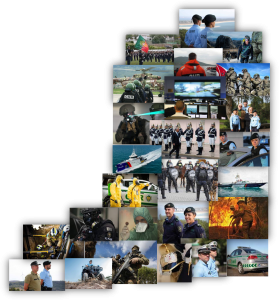
The military training module groups a variety of subjects directly related with the military component, such as:
- General Staff Doctrine and Proceedings;
- Decision-making Process;
- Techniques, Tactics and Operations;
- Justice and Discipline;
- Among others.
The technical and professional module is composed of subjects that are directly associated to the different areas of performance of the military elements attending the course. For instance:
- Integrated Information and Operations System;
- Police Legislation;
- Different subjects pertaining to Law: Penal; Administrative Proceedings; Civil, Communitarian, Fiscal, etc.;
- Human, Material and Financial Resources;
- Unit Administration;
- The ethics and behaviour module includes subjects relating to Journalistic Techniques and Relations with the Press;
- Communications, Public Relations and Protocol; Leadership and Conflict Management;
- Lastly, we have a social and cultural module which includes subjects like sociology, psychossociology, English and mathematics;
- One of the aspects that must not be forgotten when we broach training is the actual teacher, given that the teacher is undoubtedly a fundamental element to obtain successful training. The Guarda Nacional Republicana established a profile for performing duties as a teacher.
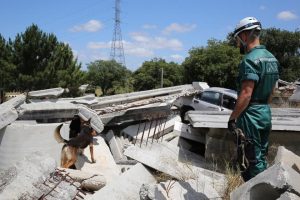 Thus being, the GNR trainer is a qualified military or civilian element, who bears specific academic and professional qualifications. The trainer’s intervention aims to make it easier to acquire acknowledgements and develop professionally adequate competences, attitudes and behaviour manners. Adequate academic qualification is understood as having equal or higher level qualifications as that of the students finishing. The technical competence refers to the domain of specific knowledge of a certain profession or professional area, based on the respective scientific, technical, technological and practical training.
Thus being, the GNR trainer is a qualified military or civilian element, who bears specific academic and professional qualifications. The trainer’s intervention aims to make it easier to acquire acknowledgements and develop professionally adequate competences, attitudes and behaviour manners. Adequate academic qualification is understood as having equal or higher level qualifications as that of the students finishing. The technical competence refers to the domain of specific knowledge of a certain profession or professional area, based on the respective scientific, technical, technological and practical training.
Implementing new technologies in teaching brought a new image upon the Knowledge Manager, turning the teacher into an e-tutor.
This new role is due to implementing new technologies in teaching. Thus, allowing us to go beyond presential teaching to e-learning and b-learning. These are new pedagogic realities wherein the GNR is taking its first steps.
Peacekeeping and International Missions
Fruit of the international commitments assumed by Portugal and due to its gendarmerie nature, it has come to participate in international peace-keeping missions within the compass of both the United Nations and the European Union throughout the world.
Among which, we may highlight its presence in Iraq, Bosnia and Herzegovina, and Timor-Leste, as well as the individual presence of Officers who are carrying out advisory duties in Kosovo, DR Congo, Guinea-Bissau, Mozambique, Palestine and Georgia.
In 2000 and for the first time in its history, the GNR deployed a selfsustained force of Company echelon abroad to the peace-keeping mission in Timor-Leste, whereby constituting itself as the UNTAET Rapid Reaction Force.
In 2003, the Guarda Nacional Republicana deployed yet another force to a peace-keeping mission. The ALFA subgroup integrated the Multinational Specialized Unit (MSU) of the Garibaldi Brigade of the Iraqi coalition forces.
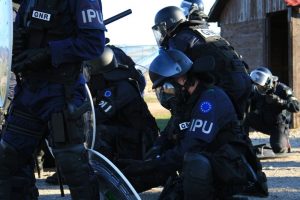 Once again in May 2006 and after previously reiterated requests from the Timorese authorities, which faced a serious internal crisis as well as major disturbances, the GNR prepares and deploys a subgroup within a week to restore and maintain public order in Timor-Leste in cooperation with the military contingents of Australia, New Zealand and Malaysia. Thus, the mission began due to a bilateral agreement between the governments of Portugal and Timor. On 24 November 2006, by way of a Resolution of the Council of Ministers, the Bravo Subgroup became an integrant part of the international police force of UNMIT (United Nations Integrated Mission in Timor-Leste), constituted through Resolution number 1704 (2006) of the United Nations Security Council. The GNR Bravo subgroup, which is constituted by 140 military elements, is currently in Timor-Leste.
Once again in May 2006 and after previously reiterated requests from the Timorese authorities, which faced a serious internal crisis as well as major disturbances, the GNR prepares and deploys a subgroup within a week to restore and maintain public order in Timor-Leste in cooperation with the military contingents of Australia, New Zealand and Malaysia. Thus, the mission began due to a bilateral agreement between the governments of Portugal and Timor. On 24 November 2006, by way of a Resolution of the Council of Ministers, the Bravo Subgroup became an integrant part of the international police force of UNMIT (United Nations Integrated Mission in Timor-Leste), constituted through Resolution number 1704 (2006) of the United Nations Security Council. The GNR Bravo subgroup, which is constituted by 140 military elements, is currently in Timor-Leste.
The Guarda Nacional Republicana within the compass of EUROGENDFOR.
Portugal integrates the European Gendarmerie Force, succinctly designated as the EUROGENDFOR (EGF), along with France, Italy, The Netherlands, Spain and Romania.
The Declaration of Intent pertaining to EGF was signed in Noordwijk – The Netherlands on 17 September 2004, whereby the Treaty that institutes and regulates EGF functioning and organization was signed in Velsen – The Netherlands on 18 November 2007.
Following the concretization process of such participation, the then five States agreed among themselves and also between themselves and the Operational Headquarters of the mission, based in Mons – Belgium, upon the contributions that each one would make towards the cited police component of Operation ALTHEA.
EGF is an operational, pre-organised, robust, and rapidly deployable force (800 elements within 30 days) with a high degree of flexibility and interoperability.
Besides participating with constituted forces, the GNR also participates in several international missions individually by way of some of its military elements.
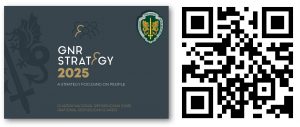 The website: http://www.gnr.pt
The website: http://www.gnr.pt


